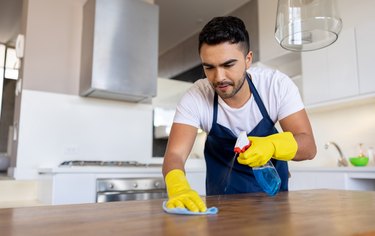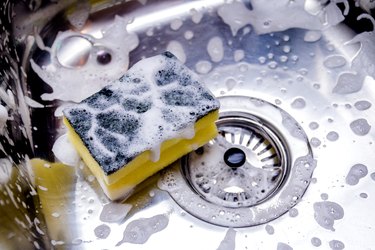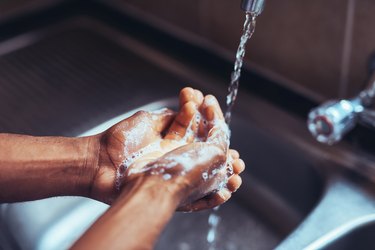
The spread of the novel coronavirus has prompted many of us to take spring cleaning to a whole new level, scrubbing down our smartphones, countertops and doorknobs daily or multiple times a day. But here's the thing: That much disinfecting probably isn't doing you any good.
At the beginning of the pandemic, there was so much buzz about picking up the virus from surfaces that it caused a shortage of alcohol-based disinfecting wipes and EPA-approved cleaners both online and in stores across the country.
Video of the Day
Video of the Day
But now, the Centers for Disease Control and Prevention (CDC) has changed its tune, saying: "Disinfection to reduce transmission of COVID-19 at home is likely not needed unless someone in your home is sick or if someone who is positive for COVID-19 has been in your home within the last 24 hours."
That's because we now know the coronavirus mainly spreads from person to person through the air, via respiratory droplets from talking, coughing or sneezing, per the CDC.
Here's a look at when to clean, when to disinfect, which areas of your home to focus on and which products to use.
Tip
Quick note: The term "cleaning" means removing germs from surfaces, while "disinfecting" means using chemicals to kill germs, per the CDC.
When to Clean vs. Disinfect

According to the CDC, you should clean high-touch surfaces regularly (i.e. daily) and after you have visitors. Other surfaces you only need to clean when they're dirty, or more often as a precaution if someone in your house is more likely to get very sick from COVID-19.
And you don't need any fancy products.
"All that's required to kill the novel coronavirus is some good old-fashioned soap and water," says Jagdish Khubchandani, PhD, MPH, an epidemiologist and associate chair and professor of heath science at Ball State University.
Why is this combo so effective? It goes back to a bit of Chemistry 101.
Like most viruses, the coronavirus is covered by a fatty membrane, Khubchandani says, and soap particles attract fat. So the virus can't help but attach itself to the soap — at which point it promptly falls apart. The last blow is the final rinse, which removes all those residual broken particles.
Laundry and dish detergent have similar qualities to hand soap, so they'll have the same effect on the coronavirus, Khubchandani says. If you want to make your own homemade cleaning solution, simply add a half cup of detergent to a half cup of water.
When to Disinfect
As for disinfecting with harsher chemicals, the CDC advises doing so when:
- Someone in your home is sick
- Someone who tested positive for COVID-19 visited your home in the last 24 hours
That's because there's still a chance (although small) that you could pick up the virus from surfaces. A March 2020 study in The New England Journal of Medicine found that it may still be present for up to four hours on copper, up to 24 hours on cardboard and up to three days on plastic and stainless steel.
What Are High-Touch Surfaces?
According to the CDC, "high-touch surfaces" include:
- Tables
- Doorknobs
- Light switches
- Countertops
- Handles
- Desks
- Phones
- Keyboards
- Toilets
- Faucets
- Sinks
How to Make Disinfectant at Home
If you're still skeptical that plain old soap and water is your best bet, then by all means try a 70 percent alcohol solution, diluted bleach (1/3 cup per gallon of water) or 0.5 percent hydrogen peroxide solution, Khubchandani says. These are all proven to work. Just make sure to let the solution sit on the surface you're disinfecting for a good 10 minutes, and then wipe it off.
But be warned: While these solutions will inactivate the coronavirus, they may also damage the surface you're trying to clean. If in doubt, test a small area first.
Tip
When using bleach, make sure it's intended for disinfection (check the label) and hasn't passed its expiration date. Never mix bleach with ammonia or any other cleanser.
If You Do Buy Household Disinfectants, Shop Carefully
If you're strolling the cleanser aisle at the supermarket, be aware that some routine household disinfectants may not help control the coronavirus, Khubchandani says.
"People buy products based on how good they smell or how expensive they are, but if they are antibacterial, they won't help fight COVID-19, which is a virus," he notes.
Instead, he says, look for products with active ingredients that have antiviral effects, such as hydrogen peroxide, isopropyl alcohol, ethanol or bleach (sodium hypochlorite). You can find this information on the product's label, along with directions on which type of surface to use it on.
Shop These Disinfectants That Kill the Coronavirus
- Seventh Generation Disinfecting Multi-Surface Wipes ($35.94 for pack of 6; Amazon)
- Lysol Disinfectant Aerosol Spray ($29.48 for pack of 4; Amazon)
- Windex Multi-Surface Cleaner and Disinfectant Spray ($3.77; Amazon)
Warning
Always wear gloves when using chemical cleaners and never ingest them. If you accidentally ingest any amount, call Poison Control at (800) 222-1222 immediately for help.
Don’t Fall for Fads

Vinegar: While cleaning with vinegar is often hyped as a more natural way to kill germs, there's no research to suggest it can fight coronavirus, and it's not on the list of EPA-recommended disinfectants, Khubchandani says.
Essential oils: Ditto for essential oils. They may make your homemade cleaners smell better, but "there is a lack of evidence that one essential oil has so much of a broad antimicrobial killing range that it would be recommended to be used as a disinfectant," says Dean Davies, cleaning supervisor for Fantastic Services, a UK-based cleaning and sanitization company.
UV light: UV light sanitizers may sound appealing, too, but they're generally not as reliable as liquid disinfectants, according to ConsumerLab.com. That's because the effectiveness depends both on the intensity of the light and the surface you're trying to disinfect. Plus, UV light can damage your skin and eyes.
Don’t Forget Your Toothbrush
If you've recently been sick with coronavirus or think you may have been exposed to it, it's a good idea to also disinfect your toothbrush once a day.
Chicago dentist Henry Hackney, DMD, recommends his patients either mix an ounce of 3 percent hydrogen peroxide with 5 ounces of distilled water or a teaspoon of 5.25 percent household bleach with a cup of cold water, and then soak the brush for 10 minutes. (Don't reuse the cleaning solution.) Just rinse the toothbrush thoroughly with tap water before you use it again.
And Remember: Wash Your Hands!
No matter how diligently you disinfect your home, the most important surface to clean is still your hands.
"It's by far the biggest, simplest, cheapest step you can take to protect yourself from coronavirus," Khubchandani says.
Again, soap and water are best, and you should aim to scrub for at least 20 seconds, according to the CDC.
Alcohol-based hand sanitizers, while effective if they have at least 60 percent alcohol, are secondary to washing your hands with soap.
"This is because when you rinse your hands, you make sure you dislodge the virus and all of its remaining particles," Khubchandani says.
Giving your hands a good scrub should be the first thing you do when you walk into your house after being out, even if you've just done a quick walk around the block.
Bottom line: The more vigilant you are about keeping your hands clean, the less you have to worry about contaminating any household objects with coronavirus.
Concerned About COVID-19?
Read more stories to help you navigate the novel coronavirus pandemic:
- The New England Journal of Medicine: "Aerosol and Surface Stability of SARS-CoV-2 as Compared with SARS-CoV-1"
- Centers for Disease Control and Prevention: "Cleaning and Disinfection for Households"
- Centers for Disease Control and Prevention: "Cleaning and Disinfecting Your Home"
- Centers for Disease Control and Prevention: "When and How to Wash Your Hands"
- ConsumerLab.com: "Does UV Light Kill Coronavirus & Germs and What Are the Best UV Sterilizer Devices?"
- U.S. EPA: "List N: Disinfectants for Use Against SARS-CoV-2"
- Centers for Disease Control and Prevention: "https://www.cdc.gov/coronavirus/2019-ncov/prevent-getting-sick/cloth-face-cover-guidance.html"
Is this an emergency? If you are experiencing serious medical symptoms, please see the National Library of Medicine’s list of signs you need emergency medical attention or call 911.